I’m not quite sure of the origins of these events or, indeed, of a succinct translation of the word, but if you think of a picnic with equestrian activities and a religious origin, you’ll be getting close to the mark. A church organised point-to-point might seem convolutedly appropriate, except there’s no racing, not much religion and with more like an adult gymkhana as accompaniment….Oh! and lots of drinking and carousing before, during and after!
Here’s some pictures from Sunday’s Romeria in Siete Pilas, a small village near us, set halfway up a mountain in the Guadiaro valley.
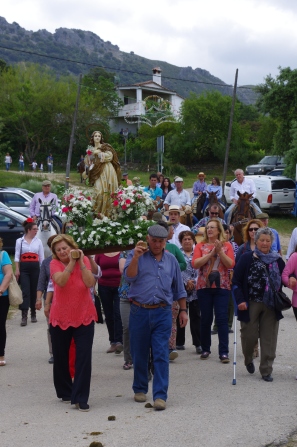
The opening parade of the virgin Mary from the church
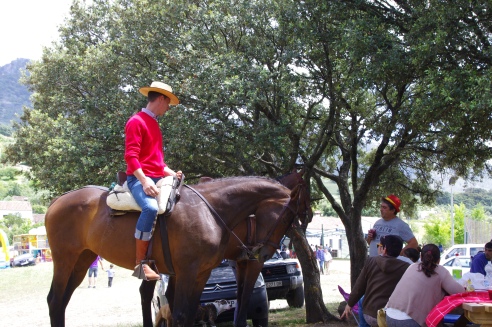
Horse and riders (this one didn’t take part in the “games”) immaculately turned out
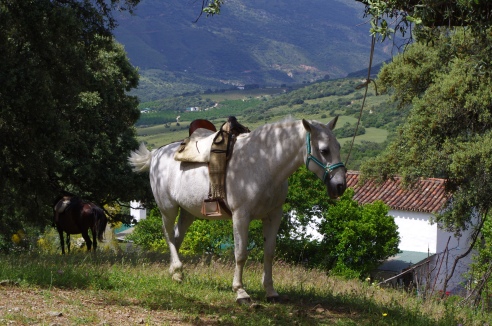
A view into the Guadiaro valley
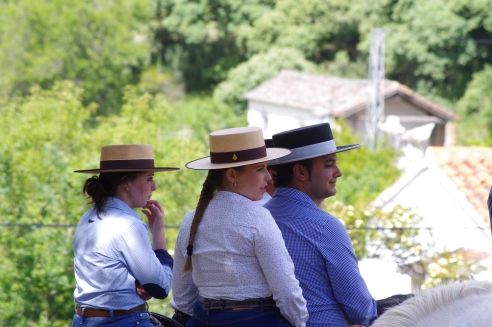
Youngsters dressed for the occasion
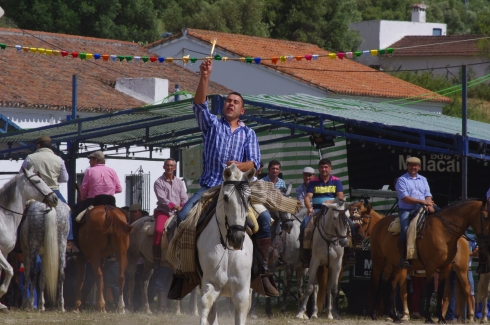
Attempting to spear the ribbon…
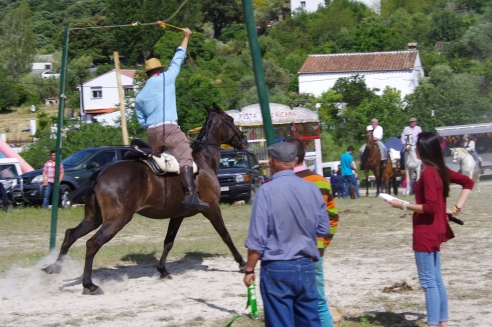
…and again
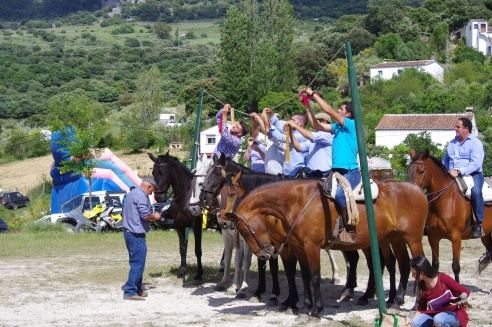
Re-loading for the next run

Determination from the older riders
That was a song from 1962 by Mike Sarne and (famously) Wendy Richard.
“All Cops Are Bastards” and the acronym A.C.A.B. is an internationally recognised anti-police slogan dating to the 1970s and made famous by the 4-Skins British punk band.
What is the connection?
Well, with a few convolutions of the (my) thought processes there’s just a thought that might impress the “leave” campaign in the forthcoming referendum we are having in the UK. As I have pointed out in my blog, many times, we do not, in my opinion, live in a democracy in this lovely adopted country of mine, although Spaniards think they do and grudgingly, I will admit they’ve come a long way since Franco died in 1975. No. We live in a bureaucracy with more than a hint of autocracy remaining from that era of dictatorship. The following newspaper article illustrates just one law that prevents the free expression of thought; and this law is not a throw-back to the days of dictatorship, it was only introduced last year!
Spanish cops issue fine over ‘All Cats Are Beautiful’ bag
A Spanish woman has been fined by police in Spain for walking through the streets of Madrid carrying a bag that declared “All Cats Are Beautiful”.
While the bag may not be to everyone’s taste and certainly won’t appeal to those who prefer dogs, Belén Lobeto, a graphic designer living in Madrid was surprised to discover that her handbag choice proved so offensive.
As she walked home on Sunday night she was pulled to one side by policemen and given an on the spot fine for the fashion article.
Despite the fact that the bag carried an image of a cat and the phrase “All Cats Are Beautiful” beneath the letters ACAB, the police insisted it was an acronym for the punk phrase “All Cops Are Bastards”.
She was therefore fined under the controversial Citizens Security Law – or Gag Law as it has been dubbed by its critics – for disrespecting the police.
“I was going quietly to my house when suddenly two officers ran up to me and asked for my ID and said they would issue a fine because I was carrying this bag,” Lobeto explained in a detailed Facebook post.
“I asked why and expressed doubt that my bag was attracting any attention much less causing a crime and told them they should take me in front of a judge to explain,” she continued.
The woman said she tried to make the police see reason but “changing their mind was impossible and if I didn’t shut my mouth I would have been taken away”.
“I asked them if there wasn’t (sic) more important things to worry about,” she added before ending her post with: “What a bloody disgusting country. But well, ALL CATS ARE BEAUTIFUL and anyone who says otherwise is lying.”

Full marks to the Madrid police for their knowledge of English!
My point is that Spain is part of the club that we joined, called the EU and this “gag” law (as it is commonly known) is just one reason why we might be worried about the rules of that club.
Spain has long pushed to one side the desire of some intellectuals to promote political correctness, but it seems that even in this land of “machismo” (or is that Italian?…but you know what I mean), it seems we will have to examine our approach to such matters. The main problem is that the perception of PC is rooted in language and the rigidity of it.
It is, of course strange to an english speaker to have to come to terms with a masculine or feminine gender being applied to any and every noun. We sniggered in French lessons at school I recall, as we had to remember that, for example, “tables” were masculine – le table – as were chairs – les chaises. We don’t snigger any longer but we have to know, if we are to speak correctly, that in Spain tables are feminine and so are chairs – las mesas y las sillas.
But, of course, with most rigid languages, there are strict rules to observe when apparent conflicts arise. The main area of concern to the PC idiots is where there is a group of people, some of whom are male and some female. The basic rule is that when addressing or talking about such groups, if the subjects are all male – no problem – you use the masculine plural. If all female, again, no problem – you use the feminine plural. But if it’s a mixed group, the rule requires you to use the masculine……and that’s unacceptable to the aforementioned idiots who, in this case (and unsurprisingly), come from the loony left, Junta de Andalucia. The Councillor for Education for the Junta de Andalucía, one Adelaida de la Calle, wants to wipe out sexist vocabulary (and values) with her ‘II Plan de Igualdad de Género en Educación’: (Second plan for gender equality in education). The plan is to eradicate gender violence and sexist attitudes and to oblige the use of inclusive and non-sexist language in the centres of education. Even the Real Academia Española – the guardian of the Spanish language – is shuddering at some of the neologisms, such as instead of los alumnos – (students) – one must now say ‘los alumnos y las alumnas’. Los funcionarios – (roughly: civil servants) – must now be called ‘el funcionariado’ and even our friends los andaluces – (andalucians) – should now be referred to as ‘la población andaluza’. Los politicos become ‘la clase política’. And so on.
….and in case you thought this was an April fool’s joke (they do have such a thing here) the newspaper article was published on 5th April!
Here’s their main areas of concern:

I have noted the following before as it raises its head from time to time in Spain and that is the propensity to rebuild architecturally important ruins as a means of preserving them for future generations. It is a marked departure from what I was used to in the UK. Here, for example is a picture of the “ruined” roman theatre at old Ronda:
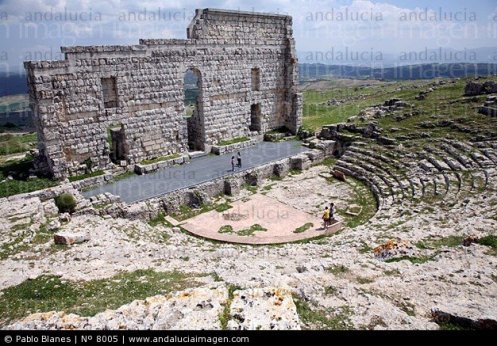
All around you can see the ruined state of whatever buildings used to be there 2000 years or so ago, yet with the reconstructed theatre wall standing newly built. It may look incongruous to some, but I don’t really have a problem with it if it serves a purpose such as educating our generation about a past civilization.
They’ve done the same in parts of the Alhambra Palace in Granada which, in my opinion, just aids the ability to present the palace as it used to be.
But, have a look at this latest example. A castle near Villamartin in Cadiz province:

The work carried out on the Castle of Matrera, in Villamartín (Cádiz), has been harshly criticized by experts on historical heritage sites.
“The landscape and the historical aspects of the site have been perverted,” says Carlos Morenés, vice-president of Hispania Nostra, a non-profit that works to defend Spain’s natural and cultural heritage.
Scholars are particularly critical of the restoration work on the tower, which has been raised back to its original height by adding a smooth, white, modern-looking wall
“It brings shame to Spain,” he adds. “The international press has called it the worst restoration in the world. Restoration legislation making it mandatory to clearly distinguish the original parts from the new has been taken to extremes, and the area has been damaged with this huge white thing. It goes against all existing regulations, including the Andalusian heritage law.”
In 2014, his association had included the Castle of Matrera on its red list in order to draw attention to its state of dereliction.
What’s the problem?
But the architect in charge of the restoration says he is surprised at all the commotion.
Carlos Quevedo explains that besides buttressing the walls, workers restored the tower’s volume using leftovers from original building material, then covering it with a layer of whitewash to distinguish the old parts from the new.
“It is a similar facing to the original one that used to cover the tower,” he adds.
The municipal archeologist, José María Gutiérrez, also supports the restoration work and says it meets all requirements of contemporary regulations.
Meanwhile, the Andalusian government’s heritage department says it has received no complaints to date.
So that’s all right then.
We’re still in limbo as regards appointing a new government following last years (December 20th) general elections and until parliament votes to appoint a prime minister, then the incumbent, Mariano Rajoy, gets to keep the baton. He runs the PP party, roughly (very roughly) a sort of Conservative Party organisation.
As was widely expected, the Socialist Party (look at it like the Labour Party group) chief Pedro Sánchez was unsuccessful on Friday evening at a second investiture vote, at which deputies in Spain’s lower house once more rejected his bid to do the job of prime minister
Sánchez’s speech during his bid touched on corruption, which he defined as “the venom that weakens democracy.”
In the wake of this vote and according to the constitution, another two-month period will now begin during which the parties can seek a new agreement amongst themselves to form a government. If that fails (and by all reckoning it surely will) Spain will be forced to hold another general election, probably in June. That’s when the Brits will have their eyes on another vote elsewhere.
But what about that comment on corruption by Sanchez?
A poll published on Thursday by El País newspaper showed that 90% of Spaniards think graft and corruption is an endemic problem within the PP party (the other lot – the newspaper support the socialists). Many think that leader Rajoy has done a half decent job of getting Spain’s economy back on track after the financial crisis left the country on the brink of ruin. But they are sick and tired of the growing list of graft allegations that are finding their way to the door of the PP’s headquarters in Madrid, a building that itself was raided by police this month after the Madrid regional party was accused of taking payments in return for public contracts. The raid led to the resignation of the Madrid region’s leader, Snra. Aguirre “Corruption is killing us,” she said at a press conference, adding (of course!) that she was not directly responsible.
Since December’s election, as well as the allegations against the Madrid regional party, the PP in Valencia has come under scrutiny. Until last summer, the party enjoyed 24 uninterrupted years running Spain’s third biggest city. Last month 24 local officials were arrested on suspicion of alleged corruption ranging from money laundering and bribery to misusing public funds. The former mayor, Rita Barberá, who was made a senator last year when she lost office, has not been declared a formal suspect. But last week, in a bid to divert flack, she nonetheless told reporters she was innocent, saying it was all a communist plot.
You can see it’s all a blame game with each side going at it tit for tat.
So. Back to the title of this piece. Who is Antonio? Well, he’s a local chap and that almost inevitably means he is a socialist voter. (We don’t get many right-of-centre Spaniards around here). He’s a builder who, since the collapse of the Spanish property market, hasn’t had too much building to be getting on with. In fact his little business, sadly became a statistic that no-one really wants to hear about. So he turned his hand to running a local bar with his wife. He made quite a good fist of it but has now closed for the winter and we all hope he’ll re-open in the summer. But not long ago he was asked by the local Brits about the corruption (that we’ve seen above) that dogs everyday life in Spain. “If it were me,” he said, “I’d take every penny I could get.”
So now we have it. It’ll be on June 23rd – the referendum I mean…and we still get to cast a vote for 15 years after leaving the UK albeit the “right” has to be renewed each year and there are more forms to fill in to get a postal/proxy or whatever, system set up. No matter. We don’t get a vote in Spain beyond local, town hall, elections so there is a symbolism there as well.
Many, to whom I’ve spoken, automatically think that an ex-pat will vote for staying in Europe – after all, we “benefit”, on the face of it, from much of what the European Union is all about. But do we? There have been Brits living in Spain for many years, just as there are many other nationalities nowadays doing so and some, like the Norwegians seem to have no sanctions applied to their residence. But Spain has always kept a tight rein on what benefits it offers non-citizens (which make one wonder just why the UK is seemingly, so generous, when it’s not a requirement of belonging to the EU club?) It’s a trifle difficult to imagine that anything really nasty would befall us Brits in the event of a brexit and, if it did, would it be an unsurmountable problem? Probably not.
What we do have, of course, is a direct, first-hand, take on what the EU means for Spain and the other less wealthy members of that club. We see – and it hasn’t really changed since 2009 – an unemployment rate of 25%, with youth unemployment nearer 50% and with those figures exceeded in Andalucia where most Brits choose to live. These are Greek levels. The lack of social unrest at this continuing and unacceptable state of affairs is more down to the maintenance of the family unit that you find on the mediterranean’s fringes, rather than to any progress to reverse the situation that the government is making.
We also see, because there’s so much incoming grant money, the waste and corruption that accompanies “free” money doled out from Brussels. You’ve only got to read some of my past blogs for examples of this. And it still goes on. The Spanish press is always reporting on some scandal or other and whilst not always involving Brussels, is an indication of the culture that prevails and that has to be traversed by those in charge of the EU’s coffers.
So, come 23rd June, I will have a great deal of soul-searching to do.
But I may just focus on the possible break-up of the UK if we exit…..and THAT would be a disaster.
Oh! it’s also likely that in June -probably the Sunday after the UK referendum – Spain will have another national general election to try and resolve the stalemate that still exists following the inconclusive one last year. Don’t you just love European politics eh?
Hello! It’s been a while since I added to this blog: not too sure why, apart from the fact that the previous chaos that surrounded Spanish life (lovable chaos some would say) has abated somewhat, although as we shall see, bubbling under are the seemingly perennial currents of unemployment, animal cruelty and siempre la politica – always politics.
Firstly (and I have written about this in the past) the European Parliament has been scrutinising what happens to some of the funds the CAP (Common Agricultural Policy) allocates to farmers in the EU and we have previously noted that bull rearers in Spain (rearing for the bullfight rather than for human consumption) can be in receipt of EU funds based solely on the acreage they have rather than the use to which the animals is put. The figure we’re talking about here is a (mere) 130 million Euros. But don’t hold your breath! Whilst the parliament has voted against financing bullfighting using this mechanism, the parliament now has to secure support for its decision from the European Council, made up of the heads of state or government of EU members. After that, agricultural policy regulations will have to be altered to include these changes just voted on in parliament.

So, when you come to vote whether to stay in the EU or come out, remember that some of your taxes go to fund the spectacle you see in this photo….and there’s probably not a lot the northern european countries can/will do to avoid it.
Secondly, we are approaching a general election. The national Parliament has been halted until December 20th when we have the election (we ex-pats don’t get to vote) and it resumes on January 13th with whatever blend of politicos are elected. Mariano Rajoy (current PM) from the Partido Popular will face the three other main parties PSOE, Ciudadanos and Podemos (plus a few tiddlers, including IU and some regional parties.
The number of jobs is up, says Rajoy trying hard to point out what few positive changes have occurred under his regime
But not in Andalucía, where six of the eight andalucian provinces have unemployment over 30%. The highest is Cádiz at 37.2%, which is 25 points more unemployment than Spain’s lowest, Soria at 12%. Andalucía’s hardest working province is Málaga at 29% unemployed (thanks, no doubt, to the tourism). Almería is at 31%. As a ludicrous patch to this situation, the Junta de Andalucía (governed by -who else – the left wing PSOE) has announced that it is to hire an extra seven thousand one hundred ‘funcionarios‘ (public officials) to massage the figures.
People often ask, when visiting our very rural part of Spain, “Just what do people do for a living out here?”
The question is, by virtue of nearly all our visitors’ backgrounds, asked from the point of view of people who have, or have had, what I call “proper” jobs and “proper ” jobs are a rare commodity here. There are a few people who drive or travel by train to Ronda; some work in the only local factory we have left after the recession, but as that is based on the construction industry, it’s a little challenged at the moment, and the remainder live a life of either no (discernible) work, or a multitude of small jobs that, combined, give them an income of sorts. Oh!…and some earn their social security input by working for the local council on menial road and street maintenance.
A village person will almost certainly have some family land nearby and, depending on the nature of that land, will have some agricultural pursuit as a result: animals; market gardening; forestry; olives or vines just about covers it. But it’s rarely enough for a full-time occupation, but there’s the mucking in with others that happens when a crop is ready or when the animals are collected for market. Other than that, it’s traditionally been the Spanish mans’ job to build and maintain the family home, so construction made up a large part of the otherwise “down” time. But as we’ve already noted, construction is still in the doldrums.
I have no direct knowledge of peoples’ tax returns nor social security claims, but I’ve always thought that most of those described above with multiple jobs would be registered as unemployed and getting whatever state handouts were up for grabs. The Spanish jobless totals remain stubbornly high. Equally, some of the cash jobs that do came about (cleaning, gardening, property maintenance for example) remain undeclared to the Spanish tax man. So, I was interested in the following article that appeared in The Economist and its references to our neighbouring village of Gaucin. Part of it is reproduced below and you will note that as a by-product of the tax man’s investigations into Spanish non-compliance, many ex-pats are being caught out NOT declaring income from renting their properties! Me? I’ve been paying Spanish tax for years!
Taxing Spaniards
Spain thinks its workers are not really as unemployed as they say
“Los revisores” are cracking down on black-market workers
Jul 23rd 2015 | GAUCIN, ANDALUSIA | Europe

HE HAD the dishevelled air of a bon vivant, someone who enjoyed his food and cared little for appearances. When he showed up in the tiny hillside village of Gaucin at the beginning of the year, driving an old car and asking for directions, no one knew who he was, or cared. But he eased into village life, gossiping with the locals in the bars, mostly about who owned what in the area. He had done his homework on Owners Direct and Airbnb, two home-rental websites, and had a list of a hundred houses that were being rented out to holidaymakers. Next he began asking about villagers who were working part-time for cash as cleaners, gardeners or handymen, some of them officially claiming to be unemployed. Soon the word spread: the taxman had come to town.
The inspectors have come to villages like Gaucin to tackle the Spanish government’s difficulties in collecting revenue, in the face of economic problems that have driven much of the country’s business activity into the shadows. Spain’s economy has been growing lately, creating 411,000 net jobs in the second quarter according to figures released on July 23rd by the national statistics agency. But while unemployment fell 1.4 percentage points, it is still an agonising 22.4%, having remained above 20% for five years. As elsewhere in southern Europe, this prolonged stagnation has encouraged workers and businesses to dodge taxes by shifting to the black market. While northern European countries now promote electronic transactions, shopkeepers and housecleaners in Spain are happy to accept cash in order to dodge value-added tax of 21%. The grey economy is estimated to make up between a fifth and a quarter of Spain’s GDP.
The government’s tax crackdown has netted almost €35 billion ($38.5 billion) extra for the state’s coffers in the past three years. But the tax agency (or Agencia Tributaria) sees scope to improve that take. It plans to step up surveillance of social media and e-commerce sites, as well as of businesses such as hotels and restaurants which it suspects of keeping two sets of accounts to under-report income. Members of the public are encouraged to blow the whistle, and to report any payments of €2,500 or more in cash. Tax inspectors are offered financial incentives to meet ambitious targets.
Already many celebrities and members of the elite are under investigation or facing charges for tax fraud. These include Princess Cristina (King Felipe VI’s sister), Barcelona football star Lionel Messi, and Rodrigo Rato, the Spanish politician who once headed the IMF. Prize-winning authors and popular singers have been caught up in the tax sweep as well. But so have the poor and the long-term unemployed. Many of those still unable to find full-time work, seven years after the start of the financial crisis, have little choice but to fall back on their families, charity, or the grey economy.
The government’s push on taxes may be hurting its own political standing, by helping to uncover a relentless stream of scandals that have whipped up popular anger against Spain’s traditional political establishment. And unemployment may need to fall much further before popular confidence improves. Many Spaniards describe a sense of a broken social contract: they resent paying taxes to a government that is delivering fewer social services.
Nonetheless, in Gaucin, the tax inspector’s visits have begun to have an effect. Reluctantly, with much grumbling about potholes and corruption, residents have started to pay up and get their affairs in order. But the leap from the informal to the formal economy can be difficult. One Gaucin resident who does odd jobs on the black market describes it as a collective-action problem: her husband, a partner in a small business, pays his taxes religiously, but “it’s impossible to make money, because there are people here in the same village who offer the same goods and services in the black economy.” Spain’s government is hoping that with rising employment levels and a few more canny tax inspectors, it can coax its people to make the shift.
The word “vecinos” in Spanish means “neighbours”. It’s also the name of a makeshift political movement here in our village of Cortes de la Frontera and was formed out of frustration with the local ruling class and their (almost guaranteed) descent into corruption and nepotism once the reins of power are held. It’s too early to say whether the established parties have learned their lessons and got the message – I personally think not – but at least there is a start to the anti-corruption movement because the “Vecinos” won the election, gaining more seats that the second placed PSOE.: and it was the PSOE who ruled this area since Franco’s demise in 1975 and the subsequent “free” election that put them in charge up to 2011.
There is, however, one problem for the new broom Vecinos: they have 5 seats out of 11 so need some allies when it comes to pushing through their legislative programme and that always opens the way to bribery and other coercive methods. Time will tell.
Here’s the results for those interested:
| VECINOS | 888 | 38,51% | 5 | |
|---|---|---|---|---|
| PSOE-A | 518 | 22,46% | 3 | |
| A.I. | 377 | 16,35% | 2 | |
| CIC | 181 | 7,85% | 1 | |
| LHP | 158 | 6,85% | ||
| P.P. | 101 | 4,38% | ||
| PA | 35 | 1,52% | ||
| IULV-CA- CORTES DE LA FRONTERA PARA LA GENTE | 26 | 1,13% | ||
| C’s |
Interestingly, the winners last time – in 2011 – were the PA (Partido Andalucista), now dwindled to just 35 votes because of the mis-management (must be aware of libel laws here!) of the now discredited mayor!
As foreigners, we do get to vote in these local elections and also in the European ones. We have no say in the national elections for the Madrid government. So it was interesting to observe what went on at the polling station when we went to vote, as well as to analyse the results. Firstly there was an impressive 85% turnout and the Vecinos winners gained 888 or 38% of the votes cast. That earned them, as mentioned above, 5 seats on the 11 person council. That’s 45% if you’re wondering. The system used is a PR one called the d’Hondt method. As usual with such methods, it’s fiendishly complicated but is generally considered, amongst those who observe such things, as being one of the most fair (or least unfair!) ways of doling out seats if you’re going down the PR route.
The way it works in Spain is via a closed list of candidates for each party. So you don’t actually get to vote for one candidate, but for a party (which has to be pre-registered). That party produces a list of its candidates – in this case 11 of them ‘cos if they won all the seats that’s the number of council places available – and you choose a party and stuff their list into the ballot box inside a plain envelope.
So we went to the polling room at the town hall and there were three officials inside and a local policeman outside. You go to the curtained-off booth to pick your chosen party list and put the piece of paper inside an envelope and approach the officials. They check you ID, mark you off on the register, and then uncover the ballot box slot so you can drop your envelope in. Job done. But wait a minute, who are the other 15 people in the room? I didn’t feel intimidated, but it could be an issue that the parties and their local supporters were allowed into the voting room. In the UK they’re banned from the actual vote but lurk outside: not so in Spain; they sit in the room to tick-off those who they think are their supporters and identify those yet to turn up!
Mustn’t knock it: They’re extremely proud of their democracy, preciously won to anyone who was alive pre-1975 and the presence of a few local activists at the vote may have to be looked at, but let’s just celebrate, for now, the ability to vote freely and kick out the corruption of the past.
Just who elects these idiots?
Benidorm town council is determined to clean up the reputation of a resort known for its bargain package holidays and mass tourism. That now is to include clamping down on licensing hours and the type of food that can be served.
Under the bylaw which is due to be passed by the council today and will come into effect next month, typical British dishes will be forced off the menu in place of more traditional Spanish fare.
“We want tourists to see that they don’t have to stick to what they know. A tortilla is a perfectly good replacement breakfast or perhaps they could try the local pan con tomate,” said Enrique Broma, the councillor in charge of tourism and culture. “We want to promote what is good about Spain,” he added.
The new regulations will see eating establishments fined if they attempt to serve food that is not traditionally Spanish unless they hold a specific “food of cultural interest” license.
The idea behind the move has come amid pressure from Spanish businesses which say they can’t compete with the huge number of expat run establishments serving British fare. It’s also, of course, a means of getting some income from issuing licences and another job for the mayor’s relatives in administering the scheme.
“We are not prepared to exclusively cater for a clientele that want to eat eggs, bacon, sausages and chips, all day. And I am certainly not going to start serving up those disgusting baked beans,” Jose Risas, the owner of El Bigote on Calle de Los Santos Innocentes, in Benidorm, and one of the proprietors who has led the campaign, told a local newspaper..
“We have lots of very decent Spanish products, Jamon is far superior to bacon for example, and chorizo beats an English banger any day,” he said.
Just imagine the business opportunity for the UK airports: “Last English Breakfast for a Fortnight” and for Ryanair: “No more bacon sandwiches for a week – get your last one on board!”.
There is an expression somewhere about gooses and golden eggs……but then again it’s also 1st April……